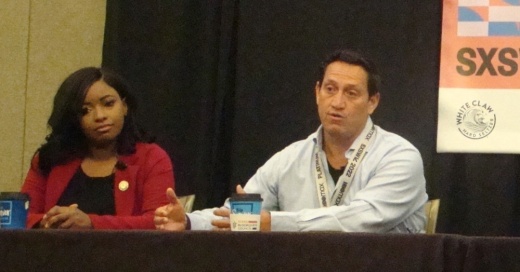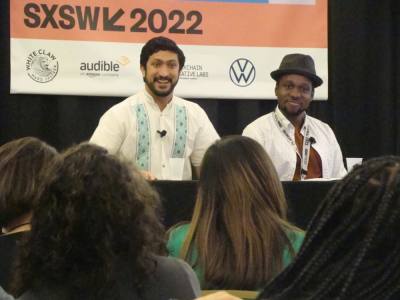This year’s South by Southwest interactive conference in Austin featured appearances by one San Antonio state lawmaker and two Congressional candidates hoping to represent the San Antonio area.
While participating in separate events, the three speakers all addressed a common theme—the importance of protests and providing a larger perspective on a controversial, complex issue.
Voting rights
Trey Martinez Fischer, representative of Texas House District 116, took part in a March 12 panel discussion about how he and 50-plus fellow Democrats broke quorum during the Texas Legislature’s special 2021 session where voting restrictions legislation was a hot topic of debate.
Martinez Fischer of San Antonio was joined in the panel by fellow State Reps. Jasmine Crockett, D-Dallas, and Claudia Ordaz Perez, D-El Paso, both of whom also were part of the quorum-breakers’ flight to Washington, D.C.
According to Martinez Fischer, Democrats in the Texas House of Representatives understood that breaking quorum and fleeing the state was an extreme, risky measure, but that something had to be done to shine a spotlight on what they called bad legislation regarding voting rights.
“We had to let the country know we weren’t going to get pushed around when it came to taking away people’s voting rights,” Martinez Fischer said.
The panelists said it was mainly Black and Latino Democratic state lawmakers who expressed the most concern about the voting rights legislation presented by the Republican-led Legislature last year, worried that new election laws would especially harm Latino and Black voters.
However, the panelists said it was important for the quorum-breaking legislators to point out that the new voting laws could adversely affect all voters around Texas, and that similar voting measures were being taken up by legislatures in other states.
“It was to show if we could do it, you could do it, too,” Martinez Fischer said.
The panelists also said breaking quorum was about holding members of their own political party accountable, who they felt were not as passionate about voting rights or other sensitive issues.
“We have to have strong members [in our party] fighting every single day because it’s bigger than Texas,” Crockett said.
Martinez Fischer said he and fellow quorum-breakers were surprised to hear about certain existing voter protections in West Virginia from Democratic U.S. Sen. Joe Manchin during their stay in Washington.
According to Martinez Fischer, mail-in voting is available to West Virginians who work shifts and cannot cast a ballot in person, or those who feel sick or do not wish to visit a polling place.
Martinez Fischer said Texas Senate Bill 1, passed last year, has made it even harder for Texas voters to cast a ballot by mail, much less register for it. However, Martinez Fischer said such voting limitations in Texas reflect what is happening around the issue in other states.
“We didn’t make it just about Texas. We made it about national voting rights,” he added.
Social movements impact policy change
Greg Casar, Democratic nominee in the race for Texas Congressional District 35, sat with a March 13 panel about creating policy change through social movements.
A former Austin City Council member and community organizer, Casar said recent social movements, such as Black Lives Matter and a push for police reform have involved incremental wins at the policymaking levels of local and state governments.
Casar said there has been “transformative change in police budgets” in some communities as a result of such movements and protests. But Casar also said some activists are disheartened when they feel not enough progress is taking place when it comes to issues, such as stemming excessive force by police, immigrant rights, steps toward marijuana decriminalization or climate change.
“In Texas, [opponents] are trying to grind us down and feel like nothing is going to change,” Casar said. “We have to recognize that when something does go well, we know we can build off of that.”
According to Casar, it is important for policymakers and politicians to speak plainly and address far-ranging matters, such as basic economic issues, in order to illicit a response from a broader audience.
That way, Casar said, more people will begin to consider new perspectives on social issues, and even advocate for them.
“The message should be, ‘We actually care,'” Casar said. “If some people ask are we going to talk about race, but we’re going to talk about people.”
Another view of immigration
Immigration attorney and Congressional candidate Jessica Cisneros was part of a March 13 discussion about immigration.
Cisneros will be in a May 24 Democratic election runoff with District 35 U.S. Rep. Henry Cuellar.
Immigration and border security are key issues in her challenge to Cuellar’s re-election campaign, Cisneros said, adding that many people have a skewed view of immigrants. Cisneros’ family immigrated from Mexico and served as farmworkers in the 1980s.
Cisneros dismissed notions of a so-called “border crisis,” saying many people who have sought to enter the United States from Central or South America are asylum-seekers stuck in Mexico because of the “remain in Mexico” policy that was launched by former President Donald Trump and expanded by President Joe Biden.
Cisneros said she knows firsthand several people who have spent years in a legal limbo trying to advance their case in the existing U.S. immigration system.
“One of the biggest things about immigration is how pigeon-holed things get. People don’t know how complicated the whole process is,” she said.
According to Cisneros, because of the expansion in Mexico policy, most would-be immigrants are not incentivized to show up at an official port-of-entry because they know they are going to be immediately denied entrance across the border.
She also said that while numbers of immigrants at the border are not high now as in previous times, some news organizations and pundits choose to focus on migrant camps and make them more of an issue than they really are.
“These are very dangerous situations that migrants are put into,” Cisneros said.
Cisneros also disputed immigration critics’ claims that the United States has an open border policy.
“That is factually not true. People are not just being let in,” she said.
Cisneros urged Americans to see reforming immigration as a human rights issue and to view border communities as places of culture, history and business, and not just statistics and opportunities to score political points in debates.
“This should affect all of us. It should be a bipartisan issue. People should realize this is a nonsensical system,” she said.







